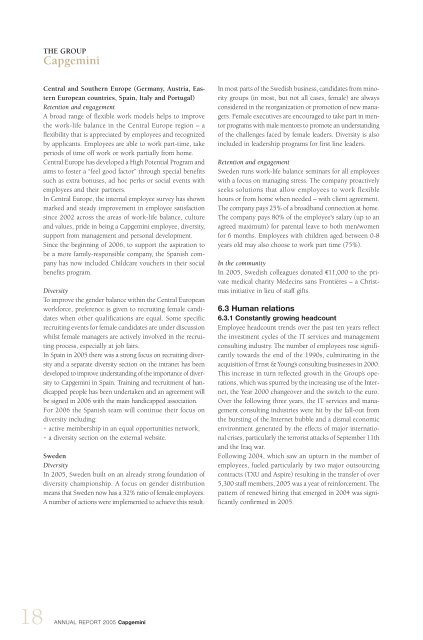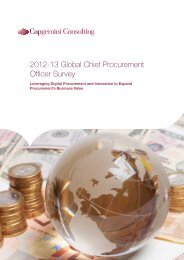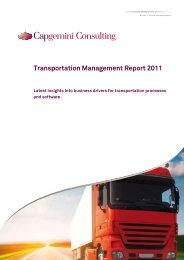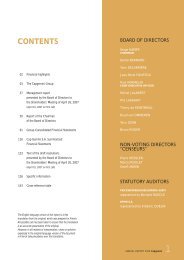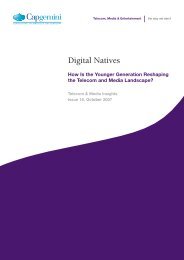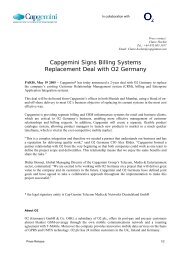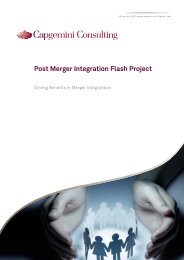You also want an ePaper? Increase the reach of your titles
YUMPU automatically turns print PDFs into web optimized ePapers that Google loves.
18 ANNUAL<br />
THE GROUP<br />
<strong>Capgemini</strong><br />
Central and Southern Europe (Germany, Austria, Eastern<br />
European countries, Spain, Italy and Portugal)<br />
Retention and engagement<br />
A broad range of flexible work models helps to improve<br />
the work-life balance in the Central Europe region – a<br />
flexibility that is appreciated by employees and recognized<br />
by applicants. Employees are able to work part-time, take<br />
periods of time off work or work partially from home.<br />
Central Europe has developed a High Potential Program and<br />
aims to foster a “feel good factor” through special benefits<br />
such as extra bonuses, ad hoc perks or social events with<br />
employees and their partners.<br />
In Central Europe, the internal employee survey has shown<br />
marked and steady improvement in employee satisfaction<br />
since 2002 across the areas of work-life balance, culture<br />
and values, pride in being a <strong>Capgemini</strong> employee, diversity,<br />
support from management and personal development.<br />
Since the beginning of 2006, to support the aspiration to<br />
be a more family-responsible company, the Spanish company<br />
has now included Childcare vouchers in their social<br />
benefits program.<br />
Diversity<br />
To improve the gender balance within the Central European<br />
workforce, preference is given to recruiting female candidates<br />
when other qualifications are equal. Some specific<br />
recruiting events for female candidates are under discussion<br />
whilst female managers are actively involved in the recruiting<br />
process, especially at job fairs.<br />
In Spain in <strong>2005</strong> there was a strong focus on recruiting diversity<br />
and a separate diversity section on the intranet has been<br />
developed to improve understanding of the importance of diversity<br />
to <strong>Capgemini</strong> in Spain. Training and recruitment of handicapped<br />
people has been undertaken and an agreement will<br />
be signed in 2006 with the main handicapped association.<br />
For 2006 the Spanish team will continue their focus on<br />
diversity including:<br />
• active membership in an equal opportunities network,<br />
• a diversity section on the external website.<br />
Sweden<br />
Diversity<br />
In <strong>2005</strong>, Sweden built on an already strong foundation of<br />
diversity championship. A focus on gender distribution<br />
means that Sweden now has a 32% ratio of female employees.<br />
A number of actions were implemented to achieve this result.<br />
REPORT <strong>2005</strong> <strong>Capgemini</strong><br />
In most parts of the Swedish business, candidates from minority<br />
groups (in most, but not all cases, female) are always<br />
considered in the reorganization or promotion of new managers.<br />
Female executives are encouraged to take part in mentor<br />
programs with male mentors to promote an understanding<br />
of the challenges faced by female leaders. Diversity is also<br />
included in leadership programs for first line leaders.<br />
Retention and engagement<br />
Sweden runs work-life balance seminars for all employees<br />
with a focus on managing stress. The company proactively<br />
seeks solutions that allow employees to work flexible<br />
hours or from home when needed – with client agreement.<br />
The company pays 25% of a broadband connection at home.<br />
The company pays 80% of the employee's salary (up to an<br />
agreed maximum) for parental leave to both men/women<br />
for 6 months. Employees with children aged between 0-8<br />
years old may also choose to work part time (75%).<br />
In the community<br />
In <strong>2005</strong>, Swedish colleagues donated €11,000 to the private<br />
medical charity Médecins sans Frontières – a Christmas<br />
initiative in lieu of staff gifts.<br />
6.3 Human relations<br />
6.3.1 Constantly growing headcount<br />
Employee headcount trends over the past ten years reflect<br />
the investment cycles of the IT services and management<br />
consulting industry. The number of employees rose significantly<br />
towards the end of the 1990s, culminating in the<br />
acquisition of Ernst & Young’s consulting businesses in 2000.<br />
This increase in turn reflected growth in the Group’s operations,<br />
which was spurred by the increasing use of the Internet,<br />
the Year 2000 changeover and the switch to the euro.<br />
Over the following three years, the IT services and management<br />
consulting industries were hit by the fall-out from<br />
the bursting of the Internet bubble and a dismal economic<br />
environment generated by the effects of major international<br />
crises, particularly the terrorist attacks of September 11th<br />
and the Iraq war.<br />
Following 2004, which saw an upturn in the number of<br />
employees, fueled particularly by two major outsourcing<br />
contracts (TXU and Aspire) resulting in the transfer of over<br />
5,300 staff members, <strong>2005</strong> was a year of reinforcement. The<br />
pattern of renewed hiring that emerged in 2004 was significantly<br />
confirmed in <strong>2005</strong>.


